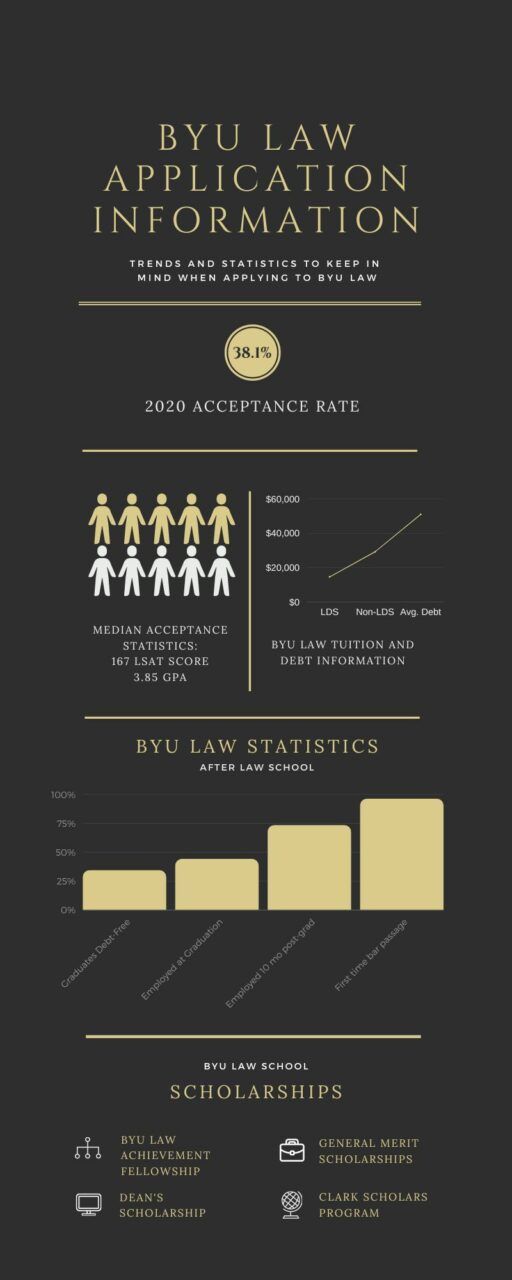
BYU Law School Dean of Admissions Anthony Grover advised pre-law students to present themselves well on their law school applications.
According to the Law School Admission Council, students who wish to be considered for admission must prepare applications, take the LSAT, submit letters of recommendation and more.
“I wish that applicants would take the time to present themselves in the most positive light possible,” Grover said. “I see a lot of grammatical and spelling errors, leaving the name of another school they applied to and not following basic directions.”
Grover also said it’s important for students to develop writing, analytic reasoning, editing and relationships with professors who can write positive letters of recommendation.
“We look at law school entrance exam scores and GPA, but we also look for people we believe can handle the rigor of law school academically and those we feel will add to the law school community,” Grover said.
Grover said the best way he has seen students stand out is through their personal statements, resumes, letters of recommendation and optional essays.
These skills are important because the written portions of applications tend to be the weakest, according to Grover.
One common law school misconception Grover said he sees often is the idea there are certain majors, clubs or jobs that will make pre-law students more palatable to admissions officers.
“From an education standpoint, one of the best ways to prepare to go to law school would be to do well in your major,” Grover said. “Pick a major that you enjoy because you want to have the best GPA possible and if you enjoy your studies, you will perform better.”
Kris Tina Carlston, director of the BYU Pre-Professional Advisement Center, said that work experience in the legal field does not make you a better applicant than those with work experience in other fields.
“It is good for you so you can get a better idea of whether law school is right for you, so it provides personal value, but don’t do it if you think it is going to make you more attractive to admissions officers,” Carlston said.
Carlston advises that students get experience in other fields of study or the workforce because then you can take that experience into the legal field. She believes that law needs people from all backgrounds.
“I did a study a few years back to see if one major does better on the LSAT or gets in more and it made no difference,” Carlston said. “Law schools want to know who you are as a person, so being interested in a variety of things makes you a more interesting candidate.”
BYU political science major Aurea Orencia is currently applying to law schools and said pre-law students should branch out and get involved in the things that interest them.
“As a freshman, I was very worried about overwhelming myself, but don’t be scared to take every opportunity that is in front of you,” Orencia said.
One opportunity that Orencia said helped her know whether law school was right for her was the BYU Pre-Law program. She said she wished she was more involved with the Pre-Law Review and Committee here on campus earlier on.
“Rip the Band-Aid off and take a practice LSAT, sign up for a LSAT prep course, attend personal statement workshops that are offered on zoom and check out our website,” Carlston said.
She said the Pre-Professional Advisement Center holds an annual BYU Law School fair, where there will be even more opportunities presented for pre-law students to take advantage of.
Jon Wayas, associate director of the Utah Center for Legal Inclusion, said they also hold pre-law symposiums at BYU.
“This is a chance to get into a law school to learn about the process of applying, meet current law students and professors and hear from them, see what a day in law school is like and even attend a mock class,” Wayas said.
Grover said the law school has a monthly event called World of Law where a BYU law professor or someone affiliated with the school gives a presentation about some area of law. Grover said there are also many other events at the law school that students can attend to help them make their decision about law school and see that it is not as scary as it seems.
Grover said the top law school misconception he sees is that law school is too competitive and that students are out to get each other.
He said that at BYU Law, while students do face stress and a sense of competition, the waters really are not as shark-infested as they are often portrayed.
“There is a spirit of cooperation and understanding that we’re all in this together that permeates our classrooms,” Grover said. “Students help each other, share notes and develop relationships with each other that will benefit them both professionally and personally.”
Grover’s final word of advice to those applying to pre-law schools is to apply as early as you can, preferably at least by a law school’s Juris Doctorate priority deadline because most law schools do admissions on a rolling basis.
“If you wait later in the cycle, there are often far less seats left unfilled and scholarship money may be all dried up,” Grover said. “It is much more difficult to get in the later you apply to schools.”





